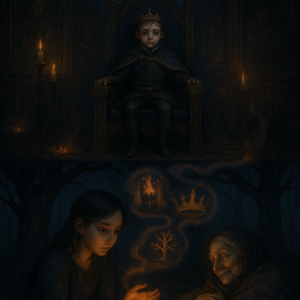The Zamindar house or The Roybari Mondir Tala haunted the edge of the darkness, a lost artifact of ages. Arnab Roy stepped out of the taxi, staring at the decaying mansion that had once been his family’s pride. The vast property fronted the village of Gopalpur, an hour’s drive from Kolkata, hemmed in by untended trees and an uncanny stillness. It had been a long time since Arnab walked there.
Having gone back after his father’s death suddenly, he stayed to look after the family business, but just walking inside the house made his head spin. As a child, he remembered the whispered warnings from villagers and stories of strange happenings tied to the old house and its pond.
Even Arnab’s dog, Shona, felt uneasy. The golden retriever, usually brave and cheerful, whimpered at the gate, refusing to move.
“What’s wrong, boy?” Arnab said, trying to coax him forward.
But Shona growled a soft reply, his tail tucked between his legs, and a quiet hollow shiver passed across his shoulder blades. Arnab sighed and muttered, “It’s only an old house…” to himself, still not wholly convinced.
For the house, the crumbling walls disliked him. It was not the fireplace with damp wood, it was some other thing. And it was engendering an immense feeling in Arnab. He couldn’t express it.
It was a simple dinner of rice and dal, followed by a lonely hour of Arnab poring over the title deeds of a variety of inherited properties. The dim room had a solitary bulb flickering in it, casting misshapen shadows of the ornate furniture onto the walls.
Just as Shona began to growl again. Arnab was startled, and he looked down at the dog who was fixedly staring out the window toward the next window that looked out to a pond behind the house. The growling turned to frantic barking and then to panting as he ran under the table, a trembling bundle afraid.
“Shona! What has come over you?” he shouted. He got up and walked around the table to look out the window.
As moonlight descended and filtered through the flimsy branches near the pond in the distance, it lazily glistened with dancing fireflies, barely visible There was still no lake of movement. Nothing ruffled the water. But he thought he saw it.
He seemed to see a sudden wavelet spreading out from the center of the pond like unseen hands oaring or a breeze ruffling the rainless atmosphere. The air was so dense it was unmoving.
He shook his head. “It’s just water.” he whispered, though his heart felt heavy with unease.
The next morning, Arnab decided to explore the house. In a locked storage room, he found a dusty old trunk filled with books, ledgers, and diaries. Among them were several journals belonging to his great-grandfather, Zamindar Hiralal Roy.
The early entries painted a picture of wealth and grandeur. Hiralal had hosted lavish feasts, entertained British officers, and ruled over the estate with pride. But as Arnab flipped through the pages, the tone changed.
One entry from 1857 stood out:
“The pond… it is no longer just a pond. I have done something unforgivable. The water remembers. It knows.“
Arnab frowned. What could his great-grandfather have meant? He continued reading, finding cryptic references to a woman named Ishani.
Memories of childhood tales came flooding back. His mother used to warn him about the pond, calling it cursed. She mentioned a maid named Ishani who had disappeared long ago. At the time, Arnab had dismissed it as a ghost story meant to scare children. But now, reading Hiralal’s words, the story felt disturbingly real.
That evening, Arnab couldn’t resist. He had to see the pond up close. He held honey-brown, languid-lidded, twinkling eyes over hands resting spread-eagled on scabby knees, and at the same time, with deliberate slowness, leaned on as if meaning to rise only to lean back in position. From the sides of his shaggy half-thick toughened peninsular torn-off head of black hair, a few pieces fell over broad sleeping eyelids, and the wrinkles of his eyes suddenly dimmed in shadow like lowering stars. To any observer, Van seemed quite settled in a dubious stupor and melancholic escape, having granted an invitation even onto the soul of an abstract observer. Arnab tied him to a nearby tree and stepped closer to the water.
As he stared into its dark surface, he noticed something strange—the reflection of the house in the water looked different. The crumbling walls and broken windows were gone. Instead, the house appeared pristine, glowing with warm light as if it were alive.
And then he saw her.
A woman’s face emerged in the reflection, pale and lifeless, her hair floating around her like black seaweed. Her hollow eyes locked onto his. Her lips moved, and though no sound came from her, Arnab heard the words echo in his head:
“You remember me now… don’t you?“
His retreating figure was shrouded in darkness, clutching terror in his heart. The woman’s countenance dimmed horribly, but the water was writhing and wriggling wildly, its surface acting as if it were agitated somewhat.
Terrified, Arnab spent the night poring over the diaries. Slowly, the horrifying truth unfolded.
Ishani had been Hiralal’s mistress. When she became pregnant, he ordered her to drown in the pond to avoid scandal. Her cries had haunted him until his death. But Ishani’s spirit didn’t rest. The pond became cursed, tied to her vengeance.
“The bloodline must pay. The water remembers. The bloodline must end.“
As Arnab read these words, a cold breeze swept through the room. He heard some water-splattered footsteps out in the corridor.
“Who’s there?” he called, with his shaking voice.
A whisper answered:
“It’s not the pond that’s cursed. It’s you.“
Arnab turned to see his father standing in the doorway. His clothes were soaked, his face pale and expressionless.
“You thought it began with Hiralal,” his father said, his voice hollow. “But the bloodline is cursed because we chose to continue it. Every generation has fed the pond. And now it’s your turn.”
“No…” Arnab whispered, backing away.
But his father’s figure dissolved into water, puddling on the floor. From outside, the pond began to ripple violently, waves crashing against its banks.
Arnab tried to run, but the ground beneath him felt like quicksand. He heard Ishani’s voice, soft but cruel:
“You can’t escape, Arnab. The water knows. The water waits.“
Before he could get to the door, two cubes of ice from his hands grabbed his legs and pulled him to the floor, his screams muted as he was dragged towards the pond, its surface agitated by dark, churning movement.
The following morning the villagers found the house untenanted, doors wide open. The pond was still once again. But when they looked into its depths, they saw something new.
Arnab’s reflection stared back at them, his face twisted in terror, trapped beneath the water’s surface.
Far away in Kolkata, a distant cousin of Arnab’s received a letter. The Roy estate, it said, was now his inheritance. The boy smiled, unaware of what awaited him in Gopalpur.









Beautiful story .well written short and crisp
Thank You so much Sir… Be with us and we promise you to deliver such amazing stories.
покупка аккаунтов магазин аккаунтов
продать аккаунт https://marketplace-akkauntov-top.ru/
магазин аккаунтов социальных сетей купить аккаунт
покупка аккаунтов аккаунт для рекламы
купить аккаунт маркетплейс аккаунтов
магазин аккаунтов купить аккаунт
заработок на аккаунтах маркетплейс для реселлеров
Profitable Account Sales Accounts for Sale
Guaranteed Accounts Secure Account Sales
Guaranteed Accounts https://socialaccountsmarket2025.com/
Buy Pre-made Account Account Buying Platform
Buy and Sell Accounts Account Trading
Account trading platform Account Acquisition
Guaranteed Accounts Secure Account Purchasing Platform
Account Exchange Service Gaming account marketplace
Secure Account Sales Accounts for Sale
Database of Accounts for Sale Profitable Account Sales
Website for Selling Accounts Social media account marketplace
website for selling accounts account selling service
account selling service account selling service
account sale sell accounts
gaming account marketplace sell account
sell account secure account sales
sell pre-made account account exchange service
verified accounts for sale secure account purchasing platform
accounts market account catalog
marketplace for ready-made accounts account market
account buying platform find accounts for sale
account exchange service verified accounts for sale
account selling service buy and sell accounts
database of accounts for sale gaming account marketplace
secure account purchasing platform account exchange
account trading secure account purchasing platform
account selling service accounts for sale
website for selling accounts accounts marketplace
account sale account store
account catalog gaming account marketplace
account trading service purchase ready-made accounts
sell pre-made account database of accounts for sale
secure account sales account buying platform
account marketplace account market
buy accounts account trading platform
secure account purchasing platform ready-made accounts for sale
secure account sales buy pre-made account
accounts for sale website for buying accounts
gaming account marketplace https://accounts-offer.org/
marketplace for ready-made accounts account marketplace
account selling platform https://buy-best-accounts.org
account acquisition https://social-accounts-marketplaces.live
sell account https://accounts-marketplace.live
social media account marketplace https://social-accounts-marketplace.xyz
gaming account marketplace https://buy-accounts.space
database of accounts for sale https://buy-accounts-shop.pro
accounts marketplace https://accounts-marketplace.art
account selling service https://social-accounts-marketplace.live/
account selling platform account marketplace
gaming account marketplace https://accounts-marketplace.online/
profitable account sales https://accounts-marketplace-best.pro/
магазин аккаунтов https://akkaunty-na-prodazhu.pro
продажа аккаунтов rynok-akkauntov.top
продажа аккаунтов https://kupit-akkaunt.xyz/
площадка для продажи аккаунтов akkaunt-magazin.online
маркетплейс аккаунтов соцсетей купить аккаунт
биржа аккаунтов kupit-akkaunty-market.xyz
площадка для продажи аккаунтов akkaunty-optom.live
купить аккаунт https://online-akkaunty-magazin.xyz/
магазин аккаунтов https://akkaunty-dlya-prodazhi.pro
площадка для продажи аккаунтов https://kupit-akkaunt.online/
facebook accounts for sale facebook accounts for sale
facebook ads account for sale buy a facebook account
cheap facebook advertising account https://buy-ad-account.top/
facebook ad accounts for sale facebook ads accounts
cheap facebook account https://ad-account-buy.top
buy aged facebook ads account https://buy-ads-account.work/
buy facebook ads manager buy facebook accounts for ads
buy facebook account for ads https://buy-ad-account.click
Эта информационная заметка содержит увлекательные сведения, которые могут вас удивить! Мы собрали интересные факты, которые сделают вашу жизнь ярче и полнее. Узнайте нечто новое о привычных аспектах повседневности и откройте для себя удивительный мир информации.
Ознакомиться с деталями – https://medalkoblog.ru/
buy facebook accounts for advertising ad-accounts-for-sale.work
buy google ad threshold account https://buy-ads-account.top
buy google adwords accounts https://buy-ads-accounts.click
buy facebook account for ads https://buy-accounts.click
google ads account for sale buy google ads threshold account
buy google ads invoice account https://ads-account-buy.work
buy google ads agency account https://buy-ads-invoice-account.top
google ads reseller https://buy-account-ads.work
google ads accounts google ads account for sale
buy verified google ads account https://sell-ads-account.click
facebook bm account https://buy-business-manager.org
buy verified google ads accounts https://ads-agency-account-buy.click
buy adwords account buy aged google ads account
buy verified business manager facebook https://buy-business-manager-acc.org
buy fb business manager https://buy-bm-account.org
buy facebook business managers https://buy-verified-business-manager-account.org/
verified facebook business manager for sale buy fb business manager
buy business manager account https://business-manager-for-sale.org/
buy facebook business manager verified https://buy-business-manager-verified.org/
facebook bm for sale https://buy-bm.org/
facebook verified business manager for sale https://verified-business-manager-for-sale.org
buy facebook verified business account buy-business-manager-accounts.org
buy tiktok ads accounts https://buy-tiktok-ads-account.org
buy tiktok business account buy tiktok ad account
buy tiktok ad account https://tiktok-ads-account-for-sale.org
buy tiktok ad account https://tiktok-agency-account-for-sale.org
tiktok ad accounts https://buy-tiktok-ad-account.org
tiktok ads account for sale https://buy-tiktok-ads-accounts.org
buy tiktok business account https://buy-tiktok-business-account.org
tiktok ads agency account https://buy-tiktok-ads.org
buy tiktok ads https://tiktok-ads-agency-account.org
facebook ad accounts for sale accounts marketplace account exchange service
cheap facebook advertising account buy pre-made account account purchase